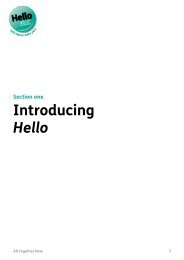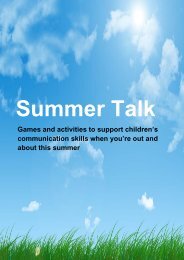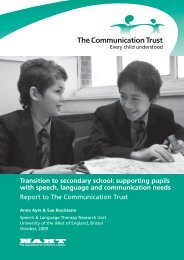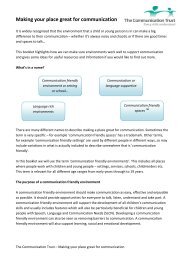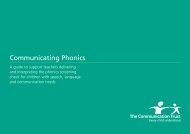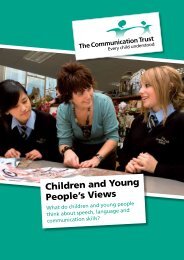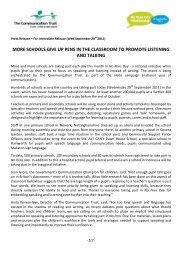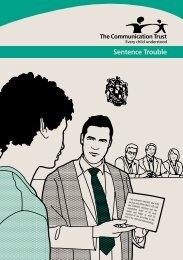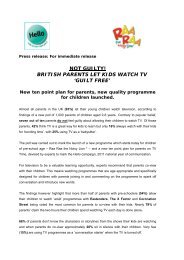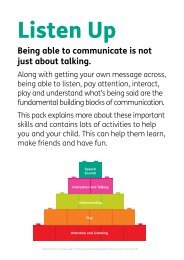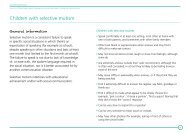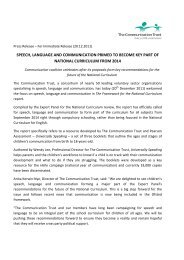here - The Communication Trust
here - The Communication Trust
here - The Communication Trust
You also want an ePaper? Increase the reach of your titles
YUMPU automatically turns print PDFs into web optimized ePapers that Google loves.
throughout schools. We believe that t<strong>here</strong> should be a recognised specialism in Speech,<br />
Language and <strong>Communication</strong> Needs and that all schools should have effective access to,<br />
and input from, teachers with specialist skills, either within their school or through an<br />
appropriate network or cluster approach.<br />
Consequently, we would like to see the framework ensure that all teachers are incentivised<br />
to understand and capitalise on the crucial role of communication skills within their<br />
classroom for all pupils, as well as having the skills and knowledge to effectively identify,<br />
support and teach pupils with SLCN is clear. We would like to bring to your attention that<br />
the skills and associated knowledge that we believe are required are detailed in <strong>The</strong><br />
<strong>Communication</strong> <strong>Trust</strong>’s Speech, Language and <strong>Communication</strong> Framework (SLCF) across 4<br />
stages, from universal skills, through enhanced and specialist to those developed through<br />
masters level learning.<br />
To what extent do you agree or disagree with our proposed approach to judging the<br />
quality of training across the partnership?<br />
Do you have any comments or suggestions?<br />
A number of points which inspectors will evaluate in their inspection have a strong<br />
relationship to understanding and effective practice in speech, language and<br />
communication, for example:<br />
• ‘trainees need to be confident and competent in teaching reading and language skills by<br />
the end of their training’<br />
• ‘the training prepares trainees to promote good behaviour through their teaching and<br />
manage challenging behaviour’ (many children and young people with behaviour needs<br />
have speech, language and communication needs, many of which are undetected)<br />
• ‘the training prepares trainees to develop learners’ numeracy and literacy skills’ – the<br />
new Ofsted framework for inspecting schools includes communication skills – this should<br />
be explicitly referenced in this document also<br />
• the training prepares trainees to assess learners’ achievement and plan and teach<br />
lessons that ensure that all learners, including those who have special educational needs<br />
and/or disabilities, make good progress .<br />
It’s important t<strong>here</strong>fore, for ITE providers and Ofsted inspectors to be fully aware of the<br />
crucial role of communication for all learners, including those with additional speech,<br />
language and communication needs, particularly in the light of the new schools inspection’s<br />
inclusion on communication skills.



